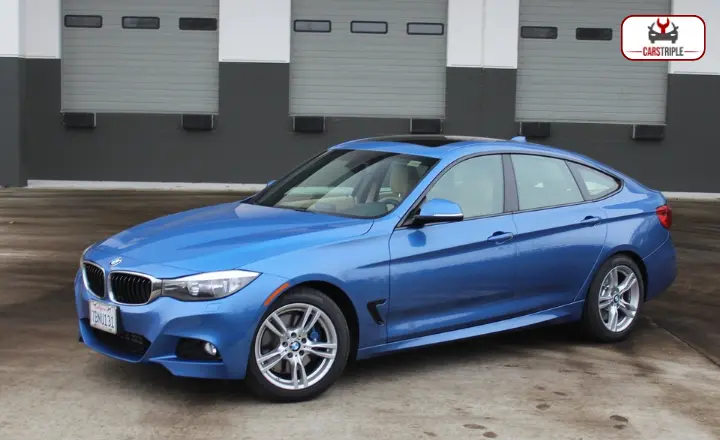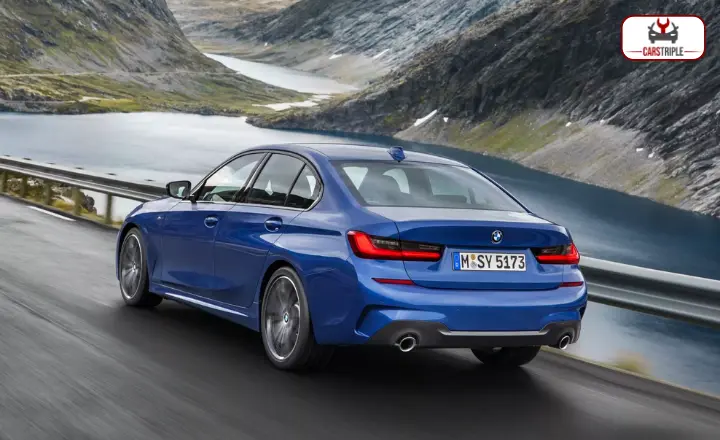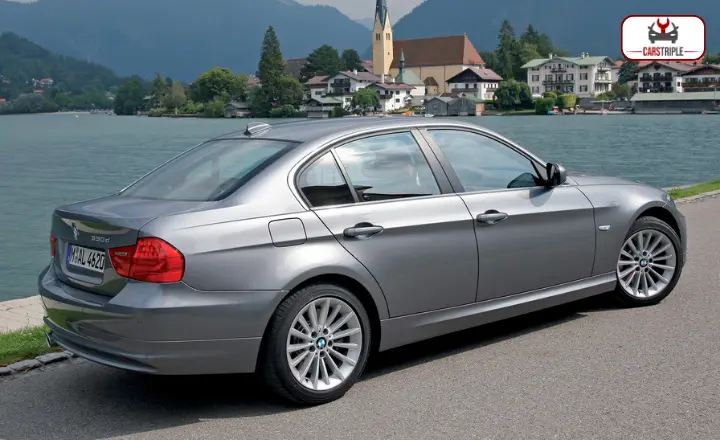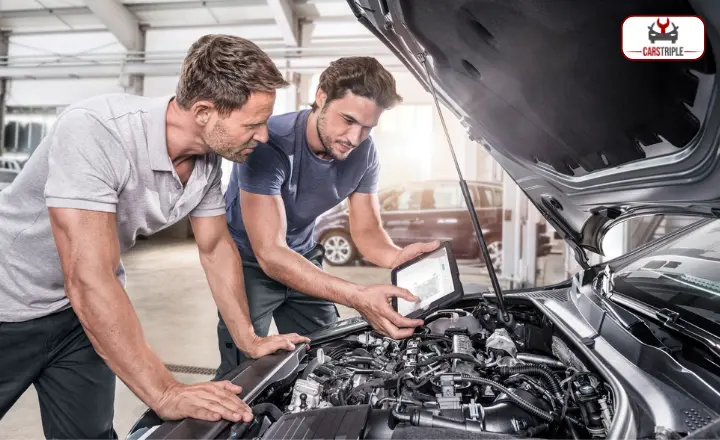Gripping the steering wheel of a BMW 3 Series feels as exhilarating as ever. You might think such an experience is reserved for new cars fresh off the production line, but what if I told you that a BMW 3 Series continues to deliver an unmatched driving experience even after years of adventures and countless miles travelled?
In this article, we unravel the mystery behind one of Germany’s finest automobiles and explore how long does a BMW 3 series lasts while remaining at the pinnacle of luxury and performance.
Overview: The highest-mileage BMW 3 Series for each generation
The BMW 3 Series has stood the test of time. Each age of this iconic car has seen remarkable mileage achievements by dedicated owners who refuse to part ways with their beloved Bimmer.
If you’re in a rush, here is an overview of our main results:
| 3 Series generation | Fuel type | Avg. of 5 highest-mileage cars on sale | Highest mileage |
| G20 (2019 – onwards) | Petrol | 88,640 miles (142,650 km) | 95,450 miles (153,610 km) |
| G20 (2019 – onwards) | Diesel | 104,770 miles (168,610 km) | 123,000 miles (197,950 km) |
| F30 (2012 – 2019) | Petrol | 203,600 miles (327,660 km) | 214,280 miles (344,850 km) |
| F30 (2012 – 2019) | Diesel | 199,460 miles (321,000 km) | 213,168 miles (343,060 km) |
| E90 (2005 – 2012) | Petrol | 224,980 miles (362,070 km) | 232,000 miles (373,370 km) |
| E90 (2005 – 2012) | Diesel | 216,520 miles (348,450 km) | 229,000 miles (368,540 km) |
| E46 (1998 – 2005) | Petrol | 230,220 miles (370,503 km) | 256,000 miles (411,990 km) |
| E46 (1998 – 2005) | Diesel | 177,270 miles (285,280 km) | 189,080 miles (304,290 km) |
How Long Does A BMW 3 Series Last? (Each Generation)
There are numerous stories of BMWs surpassing 200,000 miles on the odometer; it is crucial to note that proper servicing plays a significant role in achieving this longevity.
Regular oil changes, fluid replacements, and timely repairs are essential for running the engine smoothly and eliminating potential issues before they escalate.

In the following order, we researched the four most recent iterations of the BMW 3 Series.
- G20 3 Series (2019 – onwards)
- F30 3 Series (2012 – 2019)
- E90 3 Series (2005 – 2012)
- E46 3 Series (1998 – 2005)
G20 3 Series (2019 – onwards)
The engine is one of the most essential factors in determining a car’s lifespan. The G20 3 Series boasts a range of robust engines known for their longevity. With proper maintenance and regular servicing, these engines can easily surpass 200,000 miles or more without significant issues.
Equally important is the build quality of the vehicle itself. BMW has always been committed to using high-quality materials and employing rigorous manufacturing processes.

From the stainless steel frame to the premium components used throughout, durability is at the forefront of every decision made during production. Advancements in technology and engineering have allowed BMW to continuously improve upon each new generation, resulting in an even more dependable product year after year.
Rest assured that investing in a BMW G20 3 Series today will likely last many years, providing countless miles of enjoyment and driving satisfaction.
| BMW 3 Series G20 (2019 – onwards) | Avg. of 5 highest-mileage cars | Highest mileage | Most common trim |
| Petrol | 88,640 miles (142,650 km) | 95,450 miles (153,610 km) | 320i & 330i |
| Diesel | 104,770 miles (168,610 km) | 123,000 miles (197,950 km) | 320d |
F30 3 Series (2012 – 2019)
It’s one of the most reliable luxury cars on the market, and the F30 3 Series (2012-2019) is no exception. A BMW 3 Series can easily last over 200,000 miles or more with proper maintenance and care.
This is partly due to the high-quality materials used in its construction and the meticulous engineering that goes into every aspect of its design.
One key factor is the introduction of turbocharged engines, which offer improved fuel efficiency and increased power.
This allows for a more dynamic driving experience without sacrificing durability. Advancements in technology have led to better corrosion protection and longer-lasting components.
While it’s true that owning a BMW can come with higher upfront costs, when you consider the longevity of the F30 3 Series, it becomes clear that this investment pays off in the long run.
Not only will you enjoy years of dependability and performance, but a well-maintained BMW 3 Series retains its value exceptionally well compared to other luxury cars.
Here’s a summary of the data we found:
| BMW 3 Series F30 (2012 – 2019) | Avg. of 5 highest-mileage cars | Highest mileage | Most common trim |
| Petrol | 203,600 miles (327,660 km) | 214,280 miles (344,850 km) | 320i & 328i |
| Diesel | 199,460 miles (321,000 km) | 213,168 miles (343,060 km) | 320d & 328d |
E90 3 Series (2005 – 2012)
E90 3 Series (2005-2012) marks a significant chapter in the iconic brand’s history. With its sleek design and impressive performance, this model stands out as a true embodiment of luxury and refinement.
From the moment you look at its aggressive yet elegant exterior, it becomes clear that BMW has spared no expense in creating a visually stunning masterpiece.
But it’s not just the outer beauty that makes the E90 3 Series so captivating; it’s what lies beneath the surface that truly sets it apart.

The powerful engines, ranging from inline fours to straight sixes, deliver exhilarating acceleration and precise handling. Whether cruising down the highway or taking on twisty back roads, this car handles confidently and precisely.
You’ll find yourself surrounded by top-notch materials and ergonomic design elements. Every detail has been meticulously crafted to create an atmosphere of luxury and sophistication.
From the supple leather seats to the intuitive infotainment system, every aspect of this car is designed for your comfort and enjoyment.
Here’s a summary of the data we found:
| BMW 3 Series E90 (2005 – 2012) | Avg. of 5 highest-mileage cars | Highest mileage | Most common trim |
| Petrol | 224,980 miles (362,070 km) | 232,000 miles (373,370 km) | 320i & 328i |
| Diesel | 216,520 miles (348,450 km) | 229,000 miles (368,540 km) | 320d & 325d |
E46 3 Series (1998 – 2005)
The E46 3 BMW Series is the best and most iconic name in the automotive industry, and the E46 generation of this series, produced from 1998 to 2005, solidified its reputation as a valid driver’s car.
The E46 3 Series was its precise and agile handling. With its well-tuned suspension and balanced weight distribution, it effortlessly hugged corners while providing a comfortable ride for everyday driving.
This made it a popular choice among enthusiasts who craved performance and practicality. Another standout feature of the E46 3 Series was its range of powerful engine options.
From the smooth and responsive inline-six engines to the turbocharged M3 variant, there was something for every driving style and preference. The performance capabilities were not limited to just straight-line speed.
They were coupled with advanced technology like electronic stability control and optional performance packages that enhanced braking power and overall dynamics.
Here’s a summary of the data we found:
| BMW 3 Series E46 (1998 – 2005) | Avg. of 5 highest-mileage cars | Highest mileage | Most common trim |
| Petrol | 230,220 miles (370,503 km) | 256,000 miles (411,990 km) | 325i & 330i |
| Diesel | 177,270 miles (285,280 km) | 189,080 miles (304,290 km) | 320d & 330d |
How do you ensure your BMW 3 Series lasts as long as possible?
Regular Maintenance
One of the critical factors in ensuring your BMW 3 Series lasts as long as possible is to adhere to a strict maintenance schedule. This means regularly servicing the car, changing oil and filters, inspecting and replacing worn-out parts, and keeping up with manufacturer-recommended maintenance tasks.
Doing so keeps your vehicle running at its best and prevents minor issues from snowballing into significant problems.
2Drive Responsibly
Aggressive driving behaviors such as rapid acceleration, hard braking, and excessive speeding can put unnecessary strain on various components of your car, leading to premature wear and tear.
Make an effort to drive smoothly, accelerate gently, anticipate traffic situations well in advance, and avoid sudden manoeuvres whenever possible.
Quality Parts and Repairs
While regular maintenance goes a long way in keeping your BMW healthy, using quality parts from reputable sources is equally essential when repairs or replacements become necessary.

Cheap aftermarket parts may seem more cost-effective initially but can often be unreliable or detrimental to your vehicle’s overall performance and longevity.
Opt for genuine OEM (Original Equipment Manufacturer) parts or high-quality alternatives that meet their specifications.
What are the pros and cons of a BMW 3 Series?
The BMW 3 Series has gained immense popularity due to its stylish and sporty design, making it an ideal choice for individuals seeking a versatile vehicle with a combination of features.
Pros
- It’s a product of German engineering.
- The ride is comfortable and sporty.
- It has a stylish exterior design.
- It’s available with multiple safety features.
- The iDrive infotainment system is easy to operate.
- The interior is luxurious and has lots of modern features.
- There is a drivetrain option for everyone.
Cons
- There are high maintenance and insurance costs.
- It has a high price tag.
- Some may find the suspension too stiff.
Conclusion
In the above content, we provide a detailed guide on how long does a BMW 3 series last. It has proven to be a reliable and long-lasting vehicle. These cars can easily reach the 200,000-mile mark and beyond with proper maintenance and care.
The durable build quality and advanced engineering of the 3 Series contribute to its longevity on the road. BMW offers extensive warranty coverage for new models, providing added peace of mind for owners.
Whether you’re considering purchasing a new or used BMW 3 Series, rest assured that you’ll invest in a car that will stand the test of time.
FAQ’s
Are older model years less reliable than newer ones?
While older models may have slightly higher repair needs due to natural wear and tear over time, overall reliability depends on how well previous owners have cared for the vehicle.
Why are 2nd hand BMWs so cheap?
Depreciation plays a significant role. Maintenance and repair costs can be pretty high for BMWs. Competition within the used car market also contributes to the relatively low prices of second-hand BMWs.
